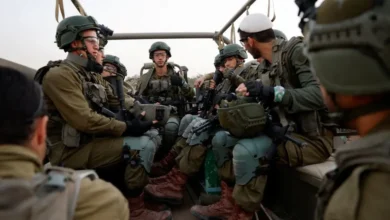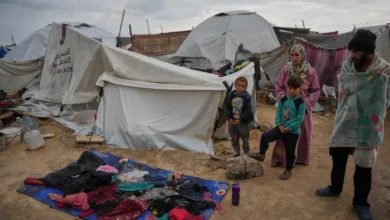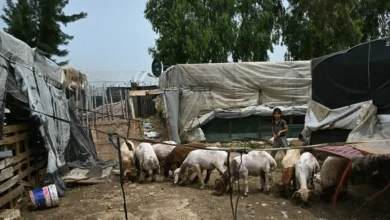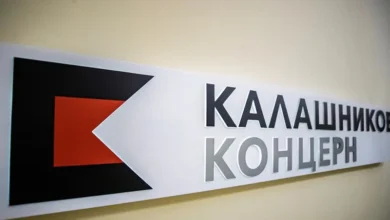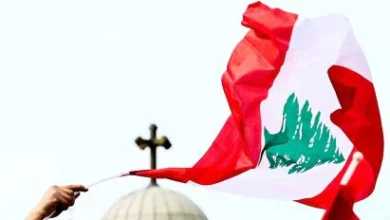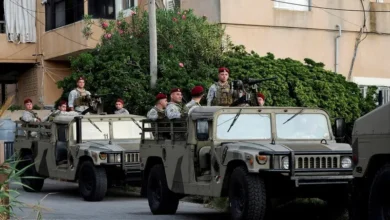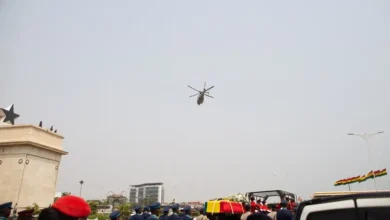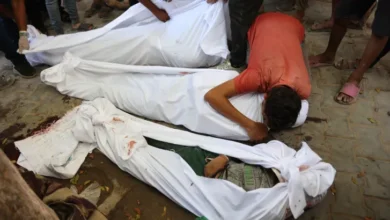Stranded aid trucks in Egypt deepen Gaza’s humanitarian crisis
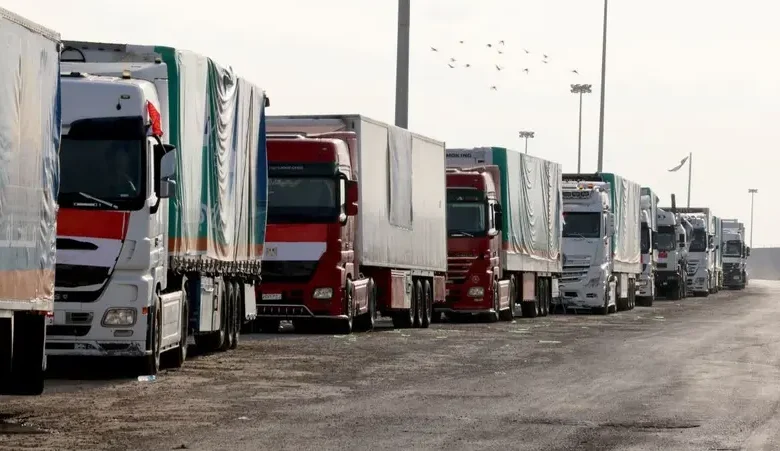
Hundreds of trucks loaded with food and water have been stranded on a scorching Egyptian road, some for nearly two months, awaiting permission to deliver the much needed humanitarian supplies to war-torn Gaza.
About 50 kilometers from the Gaza border, trucks carrying flour, water and other aid line a dusty road in both directions. The drivers say they have been waiting for several weeks in the searing Egyptian summer heat.
The standstill is exacerbating Gaza’s dire humanitarian crisis after nine months of war between Israel and Palestinian militant group Hamas. Aid groups warn there is a high risk of famine across the besieged coastal territory.
The truck drivers, parked on the outskirts of the Egyptian city of al-Arish in the Sinai Peninsula, say they have been unable to deliver humanitarian supplies ever since Israel expanded its offensive on the Gaza-Egypt border in May.
Some food has had to be discarded, they said.
“I swear to God, before this load, we came here and stood for more than 50 days and eventually the load was returned because it had expired,” said truck driver Elsayed el-Nabawi.
“We had to turn around and return it. We loaded another batch, and here we are standing again and only God knows if this load will make it before it expires or what will happen to it.”
The Israeli military started its assault on the southern Gazan city of Rafah in May. The Rafah crossing between Gaza and Egypt, a lifeline to the outside world for Gazans, allowing the delivery of aid and the evacuation of patients, has been shut since then.
Talks involving Egypt, the United States and Israel have failed to reopen Rafah, where Egypt wants a Palestinian presence restored on the Gazan side of the border. Israeli flags now fly over Gazan buildings destroyed along the border with Egypt.
“We’ve been stranded here for over a month waiting to deliver this load. We’ve waiting for our turn but nothing yet” said Ahmed Kamel, another of the truck drivers, who sit by their vehicles drinking tea and smoking cigarettes.
“We don’t know our fate – when we will be able to enter? Today? Tomorrow? The day after tomorrow? Only God knows. Will the stuff we’re carrying hold up or most of it will go bad?”
Aid and commercial supplies have still entered Gaza through other land border crossings, through air drops and by sea, but aid groups and Western diplomats say the supplies are far below needs. The drivers say they are waiting for Israeli permission.
‘Difficulties’
Distribution of aid in Gaza was difficult even before Israel’s assault on Rafah. Israel has enforced restrictions on goods entering the enclave, saying it wants to prevent them reaching Hamas. Some aid convoys have also been hit in Israeli military strikes, resulting in deaths of aid workers.
Palestinian gangs inside Gaza have also reportedly sought to steal aid and commercial supplies entering the territory of some 2.3 million Palestinians. Desperate Palestinians have also overwhelmed trucks, taking much needed humanitarian supplies.
A senior official at the Israeli foreign ministry said the backlog of aid in Egypt was due to humanitarian aid that has piled up on the Gazan side of the Kerem Shalom crossing point, creating a backlog of around 1,200 truckloads worth of aid.
The official said that while Israel continued to facilitate the entry of supplies into Gaza, the distribution network inside Gaza run by international groups had been
“disrupted” in recent months, blaming local Palestinian criminal gangs and Hamas.
The Israeli military, which oversees coordination of aid in Gaza, has said that it is letting in enough food in from Israel and Egypt for the entire population. It has also acknowledged that aid agencies face “difficulties” in transporting food once it has entered through crossing points, including from Israel.
Maha Barakat, an assistant minister in the United Arab Emirates foreign ministry and a trained medical doctor, said Palestinians who were able to leave Gaza were malnourished.
The UAE has been involved in medical evacuations from Gaza.
“They are becoming thinner and thinner,” Barakat said that aboard a UAE government chartered flight to al-Arish, and that the lack of nutrition meant wounds were unable to heal.
“It is becoming more than just injuries of war,” she said.
